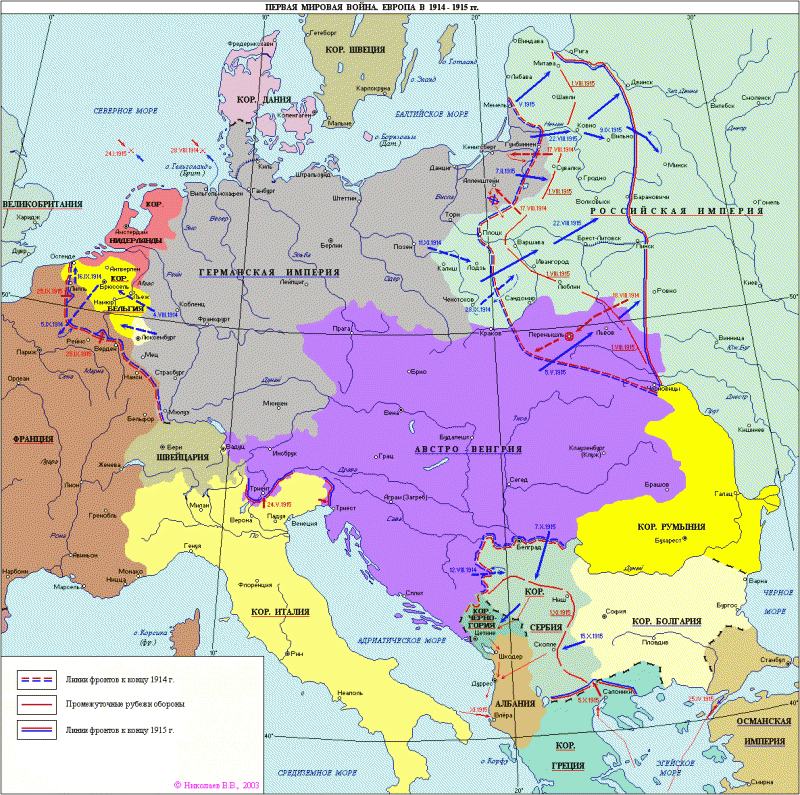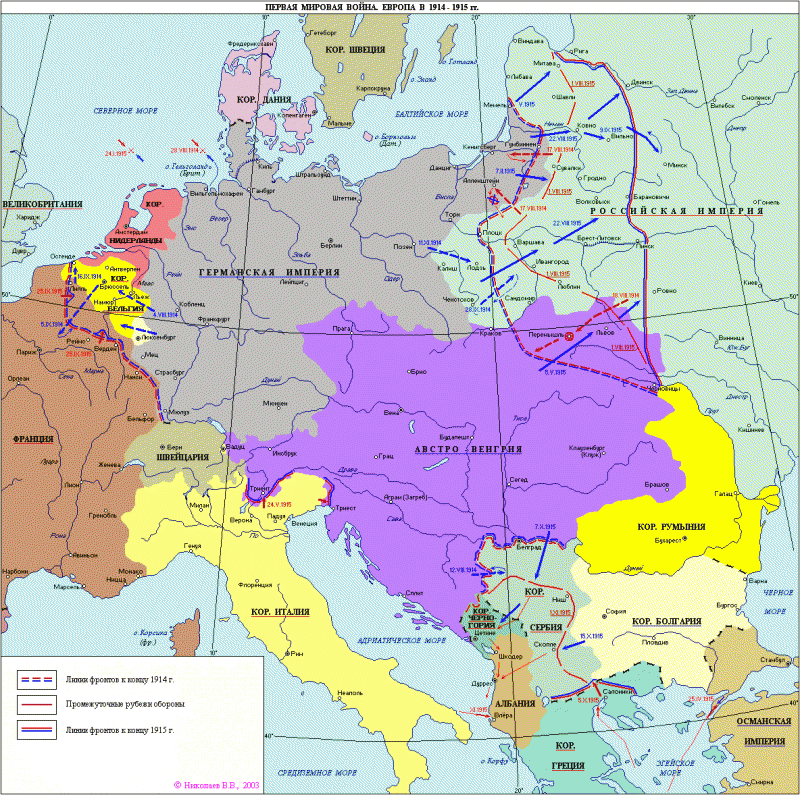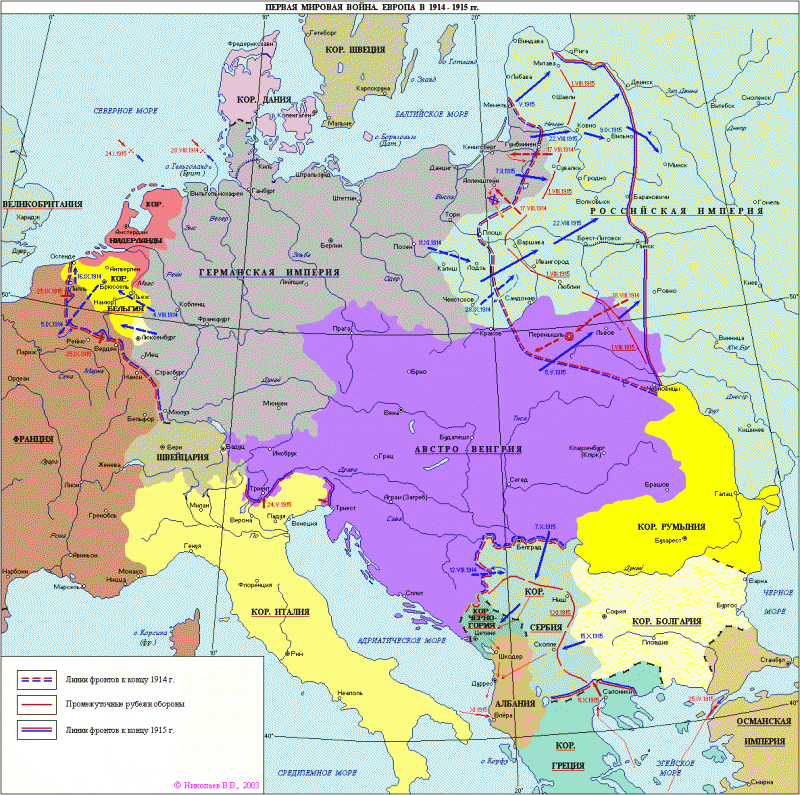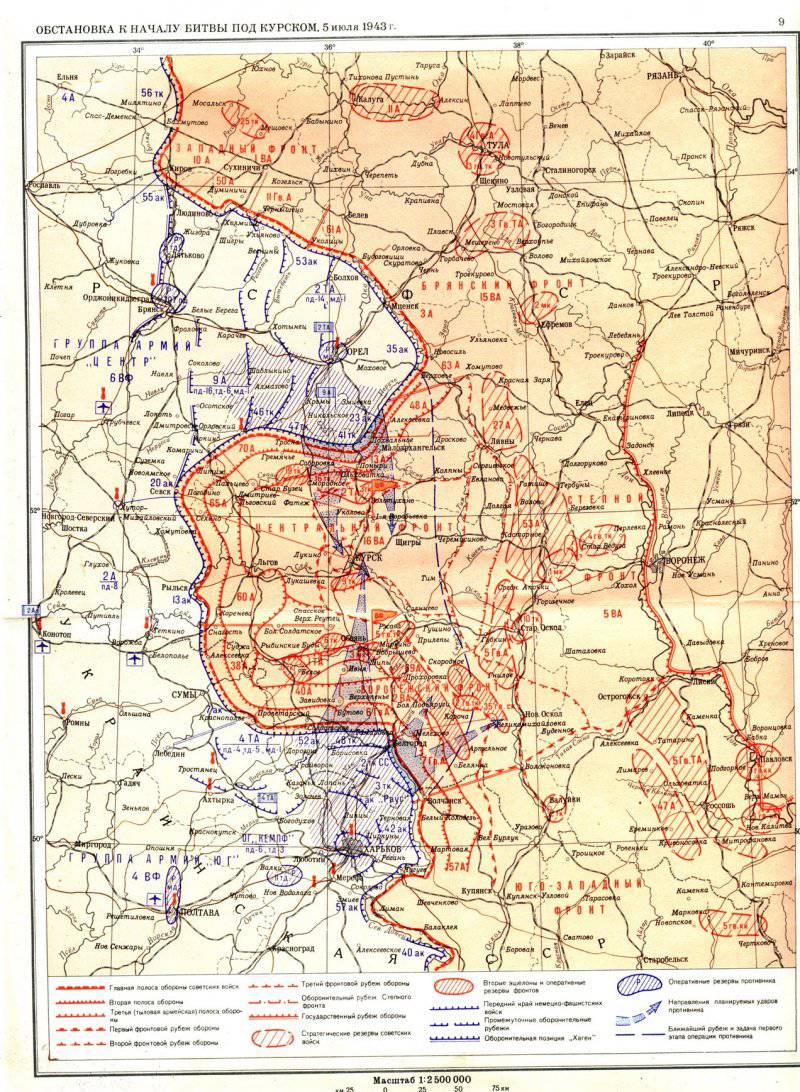World: Geopolitical aspects
The following simple arguments are put forward in favor of this thesis: Romania was quickly defeated, it had to be rescued hastily, the Russian army came to the rescue, because of which the Russian front was stretched.
However, it is absolutely clear that no matter how weak the Romanian army was, it caused certain damage to the enemy, and some of the forces distracted themselves. So, if we talk about whether Romania helped the Entente as a whole, of course, it helped, because the number of opponents of the Entente did not increase, and a new ally with its own forces (albeit weak ones) was added.
But maybe those who say that the entry of Romania into the war may be right, although it helped the Entente as a whole, but it was unprofitable for Russia? After all, the front, which after that was forced to hold the Russian army, really increased.
The increase has increased, but for some incredible reason, people who are calling on the “stretched front” manage to forget that the front of the enemy has also stretched. Austria-Hungary now had to fight with Russia not only in the East, but now also in the Southeast, where the defeated Romanian army was able to retreat. That is, this argument is untenable.
But much more important than the other. Concentrating on the purely military aspect of the events, geopolitical and diplomatic circumstances do not see the focus.
Look carefully at the map. (Romania is highlighted in yellow.)
What is the most important, world-wide nodal point located relatively close to Romania? Straits Bosphorus and Dardanelles! The long-standing goal of Russian politics in general and in World War I in particular. Historically, Russia rushed to the straits, Britain did everything possible so that Russia did not receive them. The war was still going on, and the powers wondered what the post-war world would be. The war will end, and the division of trophies between the winners will inevitably begin. From who in what condition the war ends, depends on what he can claim. Preliminary agreements will still have to be supported by their might.
Why did Russia need the straits so much? In addition to the obvious gain in the Mediterranean clearly existed and much more ambitious goal. There was a truly titanic struggle between Britain and Russia for India. Now it is hard to believe, and, by the way, enormous propaganda efforts are being made to make the Russians forget about this great page of theirs. stories. The struggle for India is strongly associated with Platov's caricature campaign. But in the West, they are well aware of how things really were, and what kind of psychosis in the spirit of “Russian go” reigned in England when Russia, step by step, moved to the treasury of the British Empire.
By the beginning of the 20th century, Russia had already reached the approaches to India in Asia, entrenched itself in Iran, and the exit to the straits created the prerequisites for the next cast - the Suez Canal. By closing the canal to the castle, Russia would have undermined the ability of the British to retain their vast Asian possessions, because then the message with the metropolis would have to be led through the path around Africa! Russia went to South Asia not only by land, but also through the Suez Canal. This grand script and implemented the Russian tsars. This is strongly opposed by the British.
So, back to the events of the First World War. The Romanian troops are defeated, the Russian army is located in the Romanian province of Moldova (not to be confused with the current Republic of Moldova, which was then part of the Bessarabian province of the Russian Empire). That is, Romania’s entry into the war allowed Russia to send troops into the country’s territory, which is essential for the subsequent struggle for the straits! And to send troops not as an occupier, but as an ally coming to the aid. Moreover, something similar was done by the British and the French, who landed already in 1915 in Greece, that is, again on the approaches to the straits. Thus, the struggle goes not only between the Entente and the Central Powers, but also within the Entente itself for more favorable conditions of the post-war world. While the British are consolidating in the Balkans from the south, Russia is doing the same, but in the north.
If Russia receives the straits, then it needs a reliable rear, which means Romania and Bulgaria need to be drawn into the orbit of their influence. Moreover, success in Romania creates excellent prerequisites for success in Bulgaria. For example, after the war, Romania could impose some kind of “friendship and cooperation” treaty, the easier it will be, given that Russian troops are already in Romania. In addition, Russia had a very powerful tool of pressure on Romania, in addition to the military.
What is Romania? How did she appear on the political map? Historically, there were three principalities in which there lived, in fact, one nation, speaking the same language and practicing the same religion. These are Moldova (Moldavia), Wallachia and Transylvania. Historically, they had periods of independence, but all three states, one way or another, became part of other countries. It is interesting that Moldova partially became part of Turkey, and partly entered the Russian Empire in the status of the Bessarabian province. Wallachia was also part of Turkey. Further, the two parts of Moldova began to develop separately from each other. After several transformations, the Bessarabian province is now known as the Republic of Moldova (the capital of Chisinau). And the other part of historical Moldova went its own way, united in 1859 with Wallachia, and after a while it received the name of the Kingdom of Romania.
I remind you that part of Moldova at that time continued to remain a part of the Russian Empire (Bessarabia). So, this was exactly the trump card of Russia. For example, Russia could put pressure on Bucharest with the threat of the “reunification of Moldova” on the terms of Russia. That is, the withdrawal from Romania of its eastern region (Moldova), where Russian troops stood in the First World War, and Bessarabia joined it. The resulting state would be completely controlled by Russia, so that Russia, formally losing Bessarabia, really took over the east of Romania. The prospect is quite real, so Russia had opportunities to force Bucharest to act as it should.
These are the prospects opened up for Russia, thanks to the fact that Romania entered the war on the side of the Entente. It was extremely beneficial to our country, but, of course, the defeat of Russia did not allow us to take advantage of the new prospects.
Again we turn to the map:
Gray painted over Germany. Next comes the "purple" Austro-Hungary, just south of Bulgaria pale yellow overgrown, with the brown Ottoman Empire, which at that time stretched all the way to the Persian Gulf. All this - the closest allies of Germany. Thus, Germany managed to create a colossal space to a large extent under the control of Berlin. Please note, Germany is bordered by Austria-Hungary, Bulgaria, in turn, is bordered by the Ottoman Empire. Only a tiny piece of Serbian land between Bulgaria and Austria-Hungary interferes with the linking of these links into one grand chain, but even without this the picture will turn out amazing - a huge block with a huge population, significant economic potential, powerful armed forces was created.
For the union to be filled with real content, it is necessary to implement common projects. And one of such projects was the creation of the so-called Baghdad road. Here are its key points: Berlin - Vienna - Istanbul - Baghdad - Basra. We take into account that Berlin has already been connected with Hamburg by rail, therefore the term “Hamburg road” is sometimes used. The projected transport artery was supposed to connect the Atlantic and Indian oceans, and thus it was about creating a new route alternative to the Suez Canal, which, by the way, was controlled by Britain.
It is clear that the appearance of the “Hamburg Road” dramatically changed the strategic balance in the Middle East. In which case, Germany could almost instantly transfer its troops to the Persian Gulf, which was in the zone of influence of Britain. By the way, in 1908, the British found oil in this region, which, of course, immediately increased the already considerable importance of the Middle East.
The strengthening of Germany also did not meet the interests of France and Russia, so that Berlin had to negotiate with the three superpowers for a long time. In 1899, Berlin agreed to allow French capital to the project; in 1911, it was necessary to recognize the interests of Russia in Iran and choose the railway route away from the Russian borders. But with the British, the Germans found a "common language" only in June 1914. Berlin transferred to London the right to build a railway line south of Baghdad in the direction of the Persian Gulf.
If we consider that the First World War began in July 1914, then from the very beginning the Anglo-German agreement was not worth a penny. I can imagine how, during the negotiations, the Germans smirked in their minds: “and we will attack tomorrow, and you will not receive anything.” So the German concession was a fiction, which meant that Germany was not going to give up its truly ambitious plans. By the way, have you not forgotten about a small piece of Serbian land that divided Austria-Hungary and Bulgaria? I think that following the results of the war, while the Germans, of course, expected to win, the Serbs would have been taken away. In this case, the German mosaic would have developed completely. Such was the plan developed in Berlin.
But at the same time, Russia was leading its own, even more ambitious game, involving the seizure of Istanbul (Constantinople), and this was an important, but still an intermediate goal of St. Petersburg. As already mentioned, Russia developed a successful expansion in Iran, Central Asia, and came close to India. Let us recall how during the Crimean War the Anglo-French fleet calmly entered the Black Sea, and how it all ended for Russia. So it was extremely necessary to hang a Russian castle on the Bosphorus and the Dardanelles. And at the next stage, one could also think about a throw to the Suez Canal, in parallel building up forces in Asia as a springboard for a throw to India. And then what should the British do? Swim to India around Africa?
Many now find it difficult to believe that the Russian Empire could set such global tasks, and not only set, but have serious chances for success. But in London already in the 19th century everything was perfectly understood, and they did everything possible to slow down the movement of Russia to the Indian Ocean. The years of anti-Russian propaganda, of course, were not in vain, and many people still believe in a backward, impoverished and dark Russian empire. When they talk about the economic miracle of the pre-revolutionary era, they immediately declare that it has been achieved at the expense of exorbitant foreign loans, payments for which have torn the Russian economy. When they hear about Mendeleev’s forecast regarding the population of our country, they attribute him a grave mistake or even begin to scoff at his great compatriot. Well, and so on and so forth. I already wrote about the forecast of Mendeleev. In fact, he was not mistaken in his premises, and the population of the country by 1950 should have exceeded 280 million people.
Allegedly, the exorbitant payments on loans were a tiny part of the country's budget, and the rate of economic growth can be judged by the data of Professor Boris Nikolayevich Mironov. Gross national product in 1885 – 1913 increased by 3,3% annually, and this despite the war with Japan, the terrorist war unleashed by the so-called revolutionaries and the 1905 revolution of the year.
And now we come to the most important thing. It is not difficult to notice that the plan of Germany intersected with the plan of Russia at the central point called Istanbul (Constantinople). The Hamburg Road passes through this city. And as for sin, this same city controls the straits, and therefore is the goal of Russia. We take into account that from the British point of view, by no means can Constantinople be handed over to Russia. The situation quickly swept over to world war, because the interstate contradictions reached such a heat that it was hardly possible to untie this knot by peaceful means. Characteristically, in 1915, Russia secured from Britain and France recognition of its claims to Constantinople, as well as the Bosphorus and Dardanelles.
Yes, in the end, Britain beat both Russia and Germany. Both great plans collapsed, and both countries were losers. London was able to realize his great defensive scenario.
For Russia, the First World War is a “strange” war. "Strange" in everything. Almost all the war to fight in the block of winners, and sign the Brest capitulation. Give samples of courage, and then forget your heroes. Yes, and the war itself is with us a completely abstract name “First World War”, although for our country it was Great Patriotic.
Do not be ashamed to lose the biggest country of all times and peoples. It is not a shame to lose to a country with a highly educated elite, a colossal experience of colonial administration, outstanding science and economics, a very strong army. It's not a shame. It is a shame now, after 100 years, to mock and spit on heroes, in difficult conditions, until the last defended the interests of our country.
Those who like to throw mud at the Russian Empire, those who are interested in military history, often cite the "Great Retreat" as an argument proving the "rottenness, mediocrity and backwardness" of the Russian Empire. In response, they are asked to compare the Great Retreat of 1915 with the retreat of the Red Army to Moscow. It is clear in whose favor the comparison. But this argument is countered by the fact that the Soviet Union opposed Germany alone, and in the First World War from Germany from the very beginning, the Western allies of Russia seriously fought. In addition, the 1941 war belongs to the era of mechanized armies, that is, it became possible to carry out rapid tank breakthroughs. So to compare the two wars is incorrect. In general, there is a long persistent debate, without the obvious rightness of one side or another. But I suggest looking at the events of 1915 from a different angle.
Again we turn to the map that has become familiar to us:
Look carefully what exactly the territory left the Russian army. A significant part of them are Polish lands. This is commonplace, everyone knows that. Moreover, everyone knows how problematic the region was the Kingdom of Poland for Russia. In 1830 – 31 and 1863 – 64 there was a Polish uprising. And in both cases, the uprising hooked and some adjacent territories, traditionally located in the zone of centuries-old Polish influence. To defeat the rebels took large-scale hostilities. Needless to say, Polish revolutionaries played an important role in the 1905 revolution of the year.
It was such a troubled region that was in the rear of the Russian army, and not deep in the rear, but located literally next to the front. Pay attention to the geopolitical position of the Kingdom of Poland. It is difficult to defend, because from the north the Polish lands are supported by Germany, and from the south by Austria-Hungary. There is a serious risk of falling into ticks. The situation looks very similar to the Kursk Arc. Here is a look:
So, I push the next version of events. Given the above circumstances, the leadership of our country decided to specifically give these territories to the enemy. Poles, you do not like Russian power, get German, and the tsarist army leaves the problem region. Thus, the Germans - the representatives of the "enlightened Europe" for the Poles turn into OCCUPIERS, with all the ensuing consequences. That is, the purpose of the retreat is not so much military as political. They retreated not because, in principle, they were unable to hold back the German offensive, but because they decided that there were more advantages than a drawback in the retreat. And it was not an escape, but a systematic retreat, accompanied by strong counterattacks. In July, the 1915 city of the Prasnysh operation, on which the Germans had high hopes, failed, and it was not possible to surround the Russian army. In autumn, the front stabilized.
During the fighting industry of the Russian Empire successfully switched to military rails, and already in June, 1916, our country prepared its answer - the famous Brusilov breakthrough. Many people think that then Russia defeated only the troops of Austria-Hungary, but this is not true. German troops, who were also on this sector of the front, suffered very heavy losses. Russia confidently went to victory in the First World War.




Information